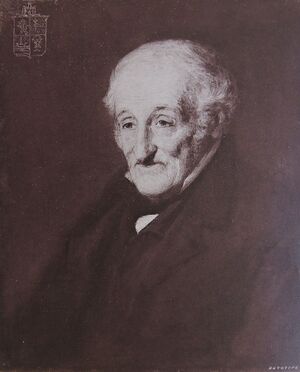Francis Ronalds (nonfiction)
Sir Francis Ronalds FRS (21 February 1788 – 8 August 1873) was an English scientist and inventor, and arguably the first electrical engineer. He was knighted for creating the first working electrical telegraph.
Ronalds was conducting electrical experiments by 1810: those on atmospheric electricity were outlined in George Singer's text Elements of Electricity and Electro-Chemistry (1814). He published his first papers in the Philosophical Magazine in 1814 on the properties of the dry pile, a form of battery that his mentor Jean-André Deluc helped to develop. The next year he described the first electric clock.
Other inventions in this early period included an electrograph to record variations in atmospheric electricity through the day; an influence machine that generated electricity with minimal manual intervention; and new forms of electrical insulation, one of which was announced by Singer.
He was also already creating what would become the renowned Ronalds Library of electrical books and managing his collection with perhaps the first practical card catalogue.
His theoretical contributions included an early delineation of the parameters now known as electromotive force and current; an appreciation of the mechanism by which dry piles generated electricity; and the first description of the effects of induction in retarding electric signal transmission in insulated cables.
Ronalds’ most remembered work today is the electric telegraph he created at the age of 28. Foreshadowing both a future electrical age and mass communication, he wrote:
electricity, may actually be employed for a more practically useful purpose than the gratification of the philosopher's inquisitive research ... it may be compelled to travel ... many hundred miles beneath our feet ... and ... be productive of ... much public and private benefit ...
why… add to the torments of absence those dilatory tormentors, pens, ink, paper, and posts? Let us have electrical conversazione offices, communicating with each other all over the kingdom ...
give me materiel enough, and I will electrify the world.
In the News
Fiction cross-reference
Nonfiction cross-reference
External links:
- Francis Ronalds @ Wikipedia
